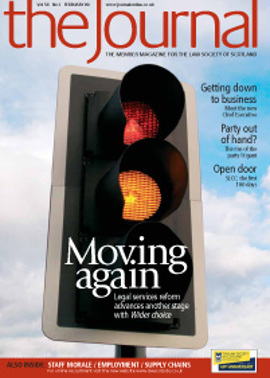Head of steam

Only operating for a few months, and already it has to propose its next annual budget and the levies to be asked of solicitors and advocates. With jurisdiction confined to cases arising from business instructed after 1 October last, practitioners could be forgiven for asking what the Scottish Legal Complaints Commission has actually been doing in that time.
The answer, it appears, is quite a bit, and not just the work of getting itself up and running – intensive though that was, according to communications manager Doreen Graham.
The lease on the Commission’s office in Waterloo Place, Edinburgh was only signed in the days before its opening, resulting in an all-hands-on-deck spell at the outset, and the early period before it deals with more complaints itself has been used for intensive staff training.
So far the SLCC has taken on a total of 23 employees, mostly from the former Scottish Legal Services Ombudsman’s Office and the Society’s complaints handling team, compared with the projected complement of 35-40, and it will keep its requirements under review in line with volume of business. Former SLSO work in particular continues at a busy level; the Commission is careful to ring fence that from former Society staff, as both the work and funding streams are different to work carried out under the Legal Profession etc Act 2007.
In fact the Commission dealt with a total of 1,226 enquiries up to the end of December, and although it does not expect to have a clear picture of its future business at least until Easter, the first proper investigations are now moving through the system.
Enquiries of course include many of a general nature or not within the jurisdiction of the SLCC at all, but the “gateway” team regularly spend 20-30 minutes with enquirers, identifying the true nature of their problem and explaining how they should take matters further if appropriate.
“The assessment of a complaint is quite a detailed process”, Graham explains. “And we have to use people’s communication skills in explaining what the Commission can and cannot do” – some callers are inevitably disappointed that it will not look into older cases. (She adds that the SLCC is already responding to some extremely detailed and time consuming freedom of information requests.)
Up to the end of the year, 405 complaint forms had been sent out and 321 returned, almost all being passed on to the professional bodies as they concern pre-1 October business, but the first cases are now going into the mediation stage and the Commission’s panel (external mediators who can be called on as and when required) is ready for them.
Head of investigations is Rosemary Agnew, who describes herself as a “professional manager with a strong interest in complaints” – a former local government assistant ombudsman in England & Wales, her CV also includes experience as a business and training consultant, and a business lecturer in China.
Agnew is clear that the Commission should not be investigating things the profession has not had an opportunity to resolve first, and some complaints have already been rejected as premature.
So far it has not had to rule complaints out as vexatious and the like, though it did turn down one complainer who refused to go back to his former advisers and take the matter up with them first.
Monitoring the pattern of complaints has thrown up few surprises – as has been the Society’s experience, many relate to poor communication or things not being done quickly enough rather than bad advice.
The Commission itself is keen to keep up communication with practitioners as well as with the public. Meetings have already been held – one in Aberdeen for example was able to allay some concerns among solicitors, and some of its letters have been amended in the light of feedback received at other presentations. In late spring it plans to run a series of roadshows to raise awareness of its powers and processes; and, Doreen Graham insists, “We are happy to give advice over the phone to practitioners as much as to complainers.”
The Commission’s proposed budget and levies for 2009-10 were published last month (Journal, January, 26). The Society encourages members to communicate their views by email to regulationqueries@lawscot.org.uk, this month. Philip Yelland, Director of Standards, said: “The Society will look at the proposals carefully, along with the categories and whether these should be changed. We will continue to represent the profession’s views to the Commission.”.
In this issue
- Cross-border disputes: new rules
- Beyond the downturn
- Take a business view
- Amber alert
- ARTL - time to reflect
- Jack to the future
- Party time
- Head of steam
- Big names for Society's big date
- Employment: without prejudice
- Simple steps
- Taken on credit
- Positive returns
- Electrical storm on the horizon?
- What's on file?
- Ask Ash
- New cases, old problems
- Fair sharing of less
- Beware - simpler rules
- Shifting sands
- Offer you can't refuse
- Website review
- Book reviews
- Weakest link
- Servitudes - new ground?






